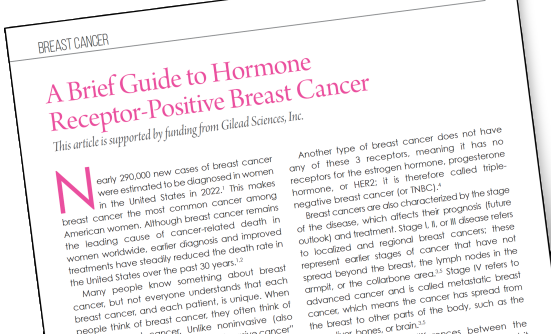
After a breast cancer diagnosis, you and your oncology team will put together a treatment plan specifically designed for you. Your personalized treatment plan will be made up of 1 or more specific treatments that are intended to target cancer cells in different ways and reduce the risk of future breast cancer recurrence. Along with treatments come side effects. In this article, I will provide an overview of each type of treatment. At the end of the article, you will find helpful lists of the possible side effects from each treatment and, most importantly, what can be done to prevent, lessen, or stop them. As always, if you are experiencing any side effects from your treatment, it is important to inform your treatment team right away.
Surgery
Surgery is usually the first line of treatment for breast cancer. The role of surgery is to lower the risk of local recurrence (the cancer coming back in the same area of the breast or lymph nodes). Breast surgery options include lumpectomy, mastectomy, sentinel or axillary lymph node dissection, breast reconstruction, and prophylactic mastectomy. Selecting the type of surgery depends on many factors: the type of breast cancer, the stage (size and extent) of the cancer, the desired cosmetic appearance, and your personal preferences.
Radiation Therapy
Radiation therapy is a local treatment that uses high-energy x-rays to kill cancer cells and shrink tumors by damaging the DNA of the cancer cell. It is typically used after surgery to destroy any cancer cells that may remain to help lower the risk of the cancer recurrence. You will meet with a radiation oncologist to discuss the number of treatments needed and the method of radiation delivery.
The side effects depend on the type of radiation therapy you are receiving (external or internal/brachytherapy), the technique (whole-breast or partial-breast radiation), and the area being treated (the breast or an area where the cancer has spread, such as the lymph nodes). Your radiation oncologist and team will be monitoring you for side effects throughout your treatment.
Hormonal Therapy
Hormonal therapy works by lowering the amount of estrogen in the body or by preventing breast cells from absorbing estrogen to lower the risk of cancer returning in the breast or in other parts of the body. This type of therapy is only effective for people with hormone receptor–positive breast cancers. There are several types of hormonal therapy medicines that you and your medical oncologist will discuss based on your breast cancer stage, bone density, history of blood clots, menopausal status, and plan for pregnancy/fertility preservation.
Immune-Targeted Therapies
Immune-targeted therapies are treatments that target specific characteristics of cancer cells (such as a proteins, enzymes, or mutations) that enable the cancer cells to grow in a rapid or abnormal way. These medicines can also help fight breast cancer by alerting the immune system to destroy cancer cells.
Chemotherapy
Chemotherapy treatment uses anticancer drugs to weaken and destroy cancer cells in the body, including cells at the original cancer site and any cancer cells that may have spread to another part of the body. Chemotherapy is used to treat all stages of breast cancer, including cancer that has come back in the breast or cancer that has spread to other parts of the body (metastatic disease). There are many kinds of chemotherapy medications, combinations, and treatment schedules that can be utilized. When deciding which chemotherapy medicines would be best for you, you and your medical oncologist will consider the stage and other characteristics of the cancer, such as hormone receptor status, HER2 status, menopausal status, as well as any other treatments you have received.
As chemotherapy treatment can affect the whole body, there can be a wide variety of side effects. You will want to discuss the possible side effects related to your exact type of chemotherapy with your medical oncologist. Your team will be able to share options to lessen, manage, or stop side effects.
Ensuring a Good Quality of Life
In recent years, breakthroughs in research have resulted in treatment advances against breast cancer, bringing new hope and excitement. Instead of only 1 or 2 options, today there is an overwhelming variety of treatment choices that fight the complex mix of cells in each individual cancer. Breast cancer treatment is no longer “one size fits all.” The decisions—surgery, then perhaps radiation, hormonal (antiestrogen) therapy, and/or chemotherapy—can feel overwhelming. You and your team will tailor a treatment plan based on the unique features of your cancer, your overall health and health history, and your preferences. As a part of your treatment plan discussion, prepare questions to discuss with your team about recommended treatments, side effects of those treatments, and ways to manage side effects to ensure quality of life as well as quantity of life.
Helpful Resources
American Cancer Society. Treating Breast Cancer. www.cancer.org/cancer/breast-cancer/treatment.html. February 2022.
Breastcancer.org. Treatment and Side Effects. www.breastcancer.org. February 2022.
Living Beyond Breast Cancer. Treatments and Research. www.lbbc.org/learn/treatments-and-research. February 2022.
Possible Side Effects of Breast Surgery
| Side Effect | What Can Be Done? |
|---|---|
| Axillary web syndrome, also called “cording,” is a ropelike structure/scar tissue under the skin of the inner arm | Cording can be managed with stretching/flexibility exercises and massage therapy. |
| Hematoma, a buildup of blood in the surgical wound | Usually, hematomas are reabsorbed by the body. In some cases, they may need to be surgically drained |
| Lymphedema, the swelling of the soft tissues, is caused by a buildup of lymph fluid when lymph nodes are removed | Lymphedema can be managed by a specialist with the use of massage, physical therapy, and/or compression bandages. |
| Seroma is a buildup of clear bodily fluid where tissue has been removed during surgery | Usually, a seroma will be reabsorbed by the body. In some cases, a seroma may need to be drained. |
Possible Side Effects of Radiation Therapy
| Side Effect | What Can Be Done? |
|---|---|
| Skin changes, much like sunburn, can include redness and possible itching, burning, soreness, peeling, blisters, or darkening of the skin | Skin reactions can be managed with the use of moisturizers, wearing loose-fitting shirts, avoiding underwire bras, and avoiding friction/rubbing of the skin in the treatment area. |
| Fatigue | Fatigue can be managed by balancing periods of rest with activity, relieving stress, eating a healthy well-balanced diet, as well as by complementary medicine techniques such as massage, meditation, and yoga. |
| Lymphedema, or swelling in the arm | Lymphedema from radiation is less common but can occur when lymph nodes under the arm are treated. Lymphedema can be managed by a specialist with the use of massage, physical therapy, and/or compression bandages. |
Possible Side Effects of Hormonal Therapies
| Side Effect | What Can Be Done? |
|---|---|
| Hot flashes | Ways to manage hot flashes include avoiding hot flash triggers, such as stress, cigarettes, alcohol, caffeine, diet pills, spicy food, hot food or drink, hot tubs, saunas, hot showers, hot rooms, and hot weather, and by dressing in layers and lowering the room temperature. |
| Vaginal dryness | Ways to manage vaginal dryness include using a water-based (not hormone-based) lubricant during intercourse or a vaginal moisturizer to help the vaginal walls stay moisturized. |
| Loss of interest in sex | Ways to manage loss of libido include talking with your partner about your feelings, trying new sexual positions, and using personal lubricants and a vaginal dilator. |
| Insomnia | Practicing good sleep hygiene, such as going to bed and waking the same time each day, avoiding alcohol and caffeine in the evening, winding down and relaxing before bedtime, and avoiding napping during the day can help to manage problems with insomnia. |
| Mood changes | Hormonal changes in your body affect the chemistry in your brain, which can result in common emotions linked to mood swings such as depression, sadness, frustration, irritation, and anger. These emotions can be managed by trying to identify and avoid sources of stress, talking about your emotions with family, friends, or a counselor, and balancing exercise with rest. |
| Weight gain | Weight gain can be managed by eating a healthy diet, limiting saturated fat, salt, sugar, and alcohol, as well as by exercising regularly. |
| Osteoporosis (bone loss/loss of bone density) | Osteoporosis can be managed with calcium and vitamin D supplements, weight-bearing exercise, and prescribed bisphosphonate medications. |
| Joint pain | Joint pain as a result of hormonal therapy can be managed with over-the-counter and prescribed pain medications, hot and cold packs, or by switching to a different hormonal therapy. |
| Higher risk of blood clots in your veins | Certain hormonal therapies can increase the risk of blood clots, which can be managed by wearing compression stockings, elevating your legs, and avoiding sitting for prolonged periods of time. |
| Increased risk of uterine (endometrial) cancer | Certain hormonal therapies can increase your risk of uterine cancer, so it is important to discuss with your medical oncologists any risk factors or history of endometrial hyperplasia/cancer. |
Possible Side Effects of Immune-Targeted Therapies
| Side Effect | What Can Be Done? |
|---|---|
| Diarrhea | Diarrhea can be managed with over-the-counter antidiarrheal medications and the use of the BRAT (bananas, rice, applesauce, toast) diet or prescription medications, if needed. |
| Hair loss | Changes in hair can be managed with the use of wigs/ head coverings and possibly prevented with the use of cold caps and scalp cooling systems. |
| Fatigue | Fatigue can be managed by balancing periods of rest with activity, relieving stress, and by eating a healthy, well-balanced diet, as well as by complementary medicine techniques such as massage, meditation, and yoga. |
| Neuropathy, including pain, numbness, loss of sensation, or discomfort caused by damage to the nerves of the peripheral nervous system | Neuropathy can be managed by handling sharp objects carefully, avoiding going barefoot and protecting your feet from injury, and by using mats in the bath and shower, checking water temperature with a thermometer before bathing or cleaning, using acupuncture/massage, and discussing a prescription medication with your oncologist. |
| Nausea | Tips to help manage nausea include eating smaller, more frequent snacks/portions throughout the day, eating dry foods and ginger-based foods, and by avoiding greasy foods and using prescribed antinausea medications. |
| Rash | Any medication has the potential of causing a rash in some people. If you think your rash is an allergic reaction to a medication or a sign of infection, stop taking the medication and call your doctor immediately. If your rash is not caused by an allergic reaction, ways to manage the rash include wearing loose-fitting clothes, washing with mild soaps, avoiding perfumes/fragrances, patting your skin dry after bathing, protecting your skin with clothing and sunscreen when outdoors, avoid scratching, and using antihistamines. |
| Low levels of white blood cells | When your white blood cell count is low, your immunity is low, and you have a higher risk of getting an infection. Ways to manage a low white blood cell count and to prevent infection include monitoring your temperature and notifying your oncologist of fever, by avoiding large crowds, by washing your hands frequently and using a hand sanitizer, preventing cuts/scrapes, and using good first aid to an injury. |
Possible Side Effects of Chemotherapy
| Side Effect | What Can Be Done? |
|---|---|
| Anemia, or low red blood cell count | Anemia can be managed by increasing your body’s iron levels by eating foods rich in vitamin B12 and taking specific medications ordered by your oncologist. |
| Diarrhea | Diarrhea can be managed with over-the-counter antidiarrheal medications and the use of the BRAT (bananas, rice, applesauce, toast) diet and prescription medications, if needed. |
| Fatigue | Fatigue can be managed by balancing periods of rest with activity, relieving stress, and eating a healthy, well-balanced diet, as well as by complementary medicine techniques such as massage, meditation, and yoga. |
| Fertility issues | Talk with your oncologist and a fertility expert about your options for preserving fertility. |
| Hair changes, including hair loss or thinning | Changes in hair can be managed with the use of wigs/head coverings and possibly prevented with the use of cold caps and scalp cooling systems. |
| Infection | Avoid infection during chemotherapy by avoiding large crowds, practicing daily hygiene and frequent handwashing, washing fruits and vegetables thoroughly, and using immediate first aid for cuts/scrapes/burns. Contact your oncology team if you experience signs of infections. |
| Memory loss | Tips to help stimulate your memory include keeping mentally active (puzzles, reading), using memory aids (note pad, calendar, phone apps), and following a routine. |
| Menopause and menopausal symptoms | Ways to ease various menopausal symptoms include dressing in layers for hot flashes, avoiding stress for managing mood swings, participating in activities to ease depression, and using personal lubricants for vaginal dryness. |
| Mouth and throat sores | Ways to manage mouth and throat sores include avoiding spicy, hot, or acidic foods and drinks, avoiding mouthwash containing alcohol, rinsing your mouth with baking soda and salt water, and by using a soft bristled toothbrush. Call your oncology team if you notice a coating to the inside of your mouth. |
| Nail changes | Chemotherapy can cause changes in the color or thickness of your fingernails or toenails or changes around the nail bed. This can be managed by keeping nails trimmed and clean, avoiding biting nails and cuticles, and by avoiding professional manicures and artificial nails. Call your oncology team with signs of inflammation or infection. |
| Nausea | Tips to help manage nausea include eating smaller, more frequent snacks/portions throughout the day, eating dry foods and ginger-based foods, and by avoiding greasy foods and using prescribed antinausea medications. |
| Neuropathy, including pain, numbness, loss of sensation, or discomfort caused by damage to the nerves of the peripheral nervous system | Neuropathy can be managed by handling sharp objects carefully, avoiding going barefoot and protecting your feet from injury, using mats in the bath and shower, checking water temperature with a thermometer before bathing or cleaning, using acupuncture/massage, and by discussing a prescription medication with your oncologist. |
| Taste and smell changes | Ways to manage taste or smell changes related to your treatment include eating cold foods with less of an aroma, eating with plastic utensils, sucking on ice chips, and rinsing your mouth with tea, ginger ale, salted water, or baking soda dissolved in water before you eat to help clear your taste buds. If you cannot stand the smell of food while cooking, you can rely on prepared foods from a store or ask someone to cook for you. |
| Vomiting | To soothe an upset stomach and recover from vomiting, try rinsing your mouth and brushing your teeth, followed by sucking on peppermint candy if you still have a bad taste in your mouth. Drink plenty of clear liquids, such as broth, juice, flat soda, sports drinks, and water to stay hydrated and replace fluids. |
| Weight changes | Ways to manage weight gain include exercising and eating a healthy diet full of vegetables, fruits, and whole grains while limiting saturated fat, salt, sugar, and alcohol. Ways to manage weight loss include trying to eat small meals or snacks every hour to make sure you get enough calories, snacking on foods high in protein but low in fat, such as yogurt and cottage cheese, lean meat or fish, and lentils, and using milk in some recipes instead of water for added calories. |















